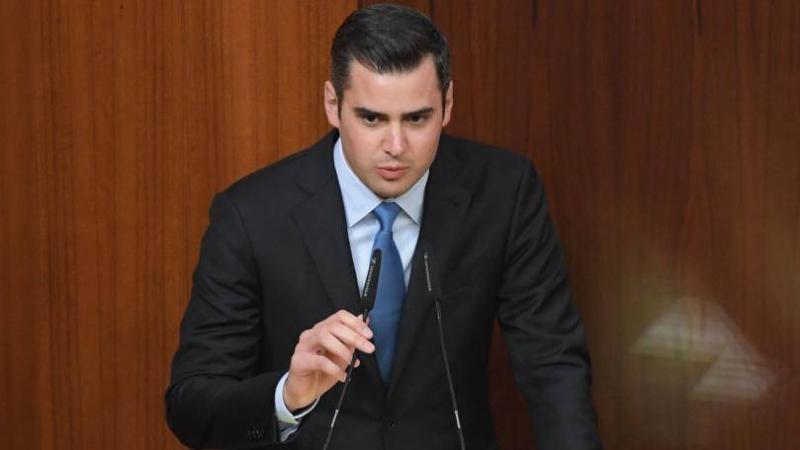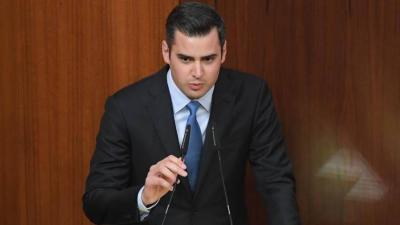Grand Mufti of the Republic Sheikh Abdul Latif Deryan received MP Tony Frangieh at Dar Al-Fatwa, in the presence of Minister of Information in the caretaker government Ziad Makary and lawyer Ziad Khazen.
After the meeting, Frangieh stated: "We visited this house, which is the house of every Lebanese and a national figure, and has a significant role in the history of Lebanon, both ancient and modern. We consider it our home because anyone in a position concerned with public affairs and involved in politics should visit all religious and spiritual authorities."
He added: "During this meeting, we discussed several matters, most notably current topics happening in the country, recent developments regarding maritime borders, and the issue of government formation, which appears to be somewhat stalled. It was also a meeting for acquaintance; we did not delve into any specific topic and did not speak about anything else beyond that; it was a broad discussion on general issues in Lebanon."
When asked about the purpose of this visit and whether it is related to the upcoming presidential elections or if it paves the way for his father, former president of the "Marada Movement", Sleiman Frangieh’s visit to this establishment, he replied: "This visit is a routine one. I believe I delayed coming to this house; I should have visited His Eminence since I was elected as an MP. I call upon all political references and individuals who hold responsibilities in Lebanon to visit all spiritual authorities, as is done with our patriarch, who receives all political figures. Every spiritual authority should have this position of respect and consultation, which is why we came to him. Some may say this visit precedes the presidential elections or has come two and a half or three months before the term of President Michel Aoun ends, but I assert that this visit did not come in this context at all; we discussed generalities and never delved into depth on any specific subject. I reiterate that the timing of this visit may raise people’s eyebrows or put it in a different context, but I firmly say that this visit was merely a protocol visit and an acquaintance meeting initiated by my dear colleague Minister Ziad Makary, who proposed the visit months ago. The delay was due to the holiday and election periods, which is why this visit was postponed until today. If someone interprets it as pertaining to the presidential elections, I consider that to be a mistake. If a visit from Sleiman Frangieh to this establishment follows, it will certainly be for this house that welcomes a Lebanese person and will not be related to our visit today."
When asked if he has hope for forming a government before reaching the presidential elections, he responded: "No. No. No."
Asked if there is no hope, he reiterated: "No."
When questioned whether we will fall into presidential vacuum, he replied: "Not one hundred percent. But let me say 99 percent. I don’t believe that the priority today is the months left, but rather the necessary reform laws that we must address and adopt. The priority is not in forming a government; there are essential reform laws that need to be addressed, whether related to the International Monetary Fund or not. We, as Lebanese and as officials in this country, as statesmen - if there are still statesmen left - must take the initiative to propose and address them. If we can finalize these laws in the remaining months of President Aoun's term and agree on maritime border demarcation, that would be an achievement in itself, because it is more important than forming a government. The most common question posed to us, the political officials, for the past ten years has been, ‘Will a government be formed?’ Because, unfortunately, we have lived most of our time without a government, and even when governments were formed, we would say, 'We wish it hadn’t been formed.'”
Frangieh added: "The main topics currently before the parliament are the four laws, and if we accomplish them, it would be more significant than forming a government. Then, if we manage to form a government, that would be better. I repeat that if we finalize the issue of demarcating the borders and begin exploration in Block 9, we will have achieved an important milestone and concluded this term better than we started."
When asked if his statement indicates that the term will conclude without forming a government, he replied: "My statement is clear; I am not optimistic about forming a government, and I believe that the political efforts being exerted today are not aimed at forming a government."
The Grand Mufti of the Republic also received a delegation from the "Founding Committee for Families of the Martyrs, Wounded, and Victims of the Beirut Port Explosion," headed by Ibrahim Hattit. They discussed the latest developments regarding the Beirut Port explosion case and the ongoing suffering of the wounded and the families of the martyrs.
Mufti Deryan expressed "his solidarity and support for this just cause and for advancing the investigations to reach the complete truth."




